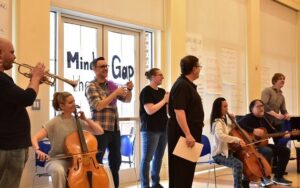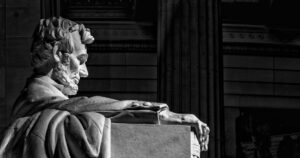As a progressive Democrat from New York City, I’ve long associated guns with gang violence and police shootings. In 2013, I was robbed at gunpoint. An acquaintance of mine is a survivor of the mass shooting at Stoneman Douglas High School in Parkland, FL. Simply put, guns scare me.
But as a leader at Braver Angels, I’m committed to broadening my perspective and talking with those whose views, experiences, and politics differ from mine. And in the wake of the recent mass shootings in Buffalo, NY, Uvalde, TX, and, most recently, Highland Park, IL, I’ve been working to see if I can learn anything that might be helpful to other Americans mired in fear, anger, and despair.
I recently hosted a podcast conversation between Mark Beckwith, a former Bishop whose gun safety activism intensified in the wake of the Newtown school shooting, and Wilk Wilkinson, a deeply conservative proponent of gun rights.
Their divide begins with their life experiences.
For Wilk, guns are a way of life. “From the day I was born there was a gun in my household, if not multiple guns,” Wilk said. “I bet I was in diapers the first time I went hunting with my dad. The first time I shot a shotgun, I was too small to even hold the gun up to my shoulder.”
And yet, safety was always paramount in Wilk’s home. Children could never touch a gun without adults present, the first thing they did when handling a gun was check that it was unloaded, and they always treated unloaded guns as if they were loaded. They never pointed a gun at anything they didn’t intend to hunt or destroy.
Mark has a very different relationship with guns. After the Newtown shooting, in which 20 children were murdered, Mark convened a group of bishops to push for gun safety legislation. Mark is committed to fighting gun violence and spreading ideas that promote gun safety, but he maintains that his project requires more than advocacy and activism; it requires listening and understanding the perspectives of gun owners.
“They were speaking a language I didn’t understand, but it was a language that is profoundly American,” Mark recounted about a gun show he visited in Massachusetts. “There’s a fear that we on the gun violence prevention side want to take their part of the culture away. We can’t do that, so we have to be engaged in conversations to listen to one another.”
To a liberal, Wilk’s views might seem irrational. How would banning assault weapons and high-capacity magazines affect his ability to own a couple of hunting rifles and a handgun or two for self-protection? But in a way, that misses the point. Wilk’s views run bone deep on the Right. They represent a deeply felt reaction to lived experience, and they must be recognized and understood to build trust and find the areas of common ground that do exist.
Acknowledging each other’s fears and pain is hardest when it feels like it legitimizes a perspective we find false and harmful. But “seeing” someone in this way is not a zero sum game, and acknowledging an opponent’s fears does not invalidate our own. Over time, it enables us to find the true empathy needed to transcend the fears that blind us to one another’s humanity and prevent us from working together for the common good.
Mark’s and Wilk’s disagreements on gun policy are profound. Wilk is suspicious of the new “red flag” legislation because he doesn’t support the idea of the government evaluating people’s psychological fitness to exercise their rights; Mark feels the recent bipartisan legislation doesn’t go far enough when it comes to closing loopholes and expanding background checks.
But the pair did find fertile ground, with both wanting to find ways to improve education on how to handle guns safely and work to prevent gun suicides. By the end of the conversation, they wanted to keep talking about their common concerns and potential solutions.
Where they didn’t see eye to eye, Mark and Wilk could feel each other’s heart. Together, they grasped for the understanding needed to establish trust, vulnerability, and emotional connection.
Attempting to bridge the gun divide can be frustrating and painful. Talking to someone whose views you find threatening is inherently fraught, and guns are an especially challenging topic because of their direct relevance to our safety and identity. These kinds of conversations are not for everyone.
But for those with the ability and desire to try, they can help us clarify disagreements, illuminate shared values, and ultimately remind us that our future as a democratic republic hinges on our ability to talk across the divide, even if—and perhaps especially when—it feels hopeless.



